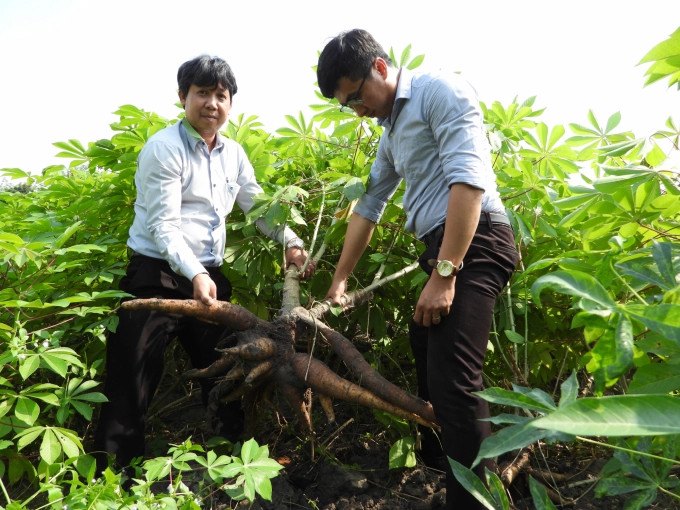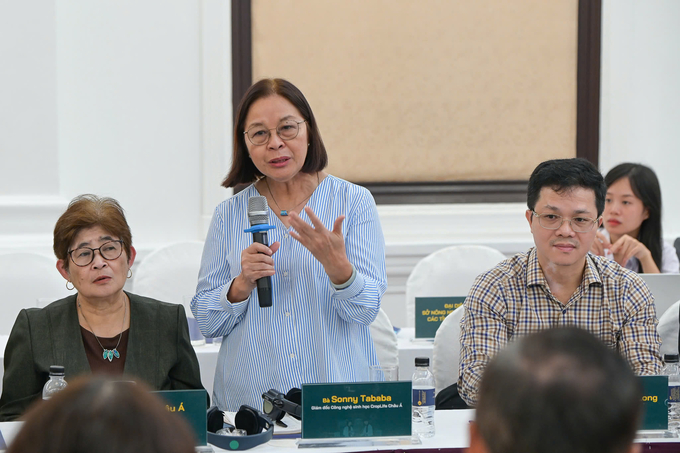May 16, 2025 | 09:45 GMT +7
May 16, 2025 | 09:45 GMT +7
Hotline: 0913.378.918
May 16, 2025 | 09:45 GMT +7
Hotline: 0913.378.918

The forum “Achievements and directions for applying biotechnology to support sustainable agricultural development in the context of international integration” was held on the morning of October 5 in Hanoi. Photo: Tung Dinh.
“It is regrettable that the application of biotechnology in Vietnam remains slow, with the gap between us and the rest of the world widening. The goals set by the Party and the State have not yet been met,” remarked Cao Duc Phat, former Minister of Agriculture and Rural Development, at the forum titled “Achievements and directions for applying biotechnology to support sustainable agricultural development in the context of international integration” in Hanoi on October 5.
In the era of the 4.0 industrial revolution, digital technologies such as AI are also serving as catalysts for stronger biotechnology development. Therefore, the former Minister emphasized the urgent need for a strategy focused on human resource training, alongside the establishment of appropriate policies and mechanisms to harness the momentum of biotechnology.
Echoing Dr. Cao Duc Phat’s concerns, Nguyen Huu Ninh, Deputy Director of the Department of Science, Technology, and Environment (MARD), noted that scientific and technological research often lags behind real-world needs. “Today’s adjustments may take years to show their full effects, making the impact of biotechnology challenging to perceive,” Ninh explained.
Thus, adjusting the application of technology is essential to developing new varieties that improve production efficiency, meeting the demands of food security.
To ensure biotechnology applications lead to breakthroughs, modern breeding techniques, genetic engineering, and genome editing have produced new crop varieties with desirable traits such as drought resistance, disease resistance, salt tolerance, improved nutrient absorption, increased productivity, and enhanced water use efficiency.
Most recently, Resolution No. 36-NQ/TW, issued by the Politburo on January 30, 2023, outlined the objective of developing biotechnology into a critical technical and economic sector.
In the short term, the Department of Science, Technology, and Environment has proposed that the MARD prioritize the development and optimization of key laboratories, with a particular focus on cell technology and nanotechnology.
Mr Nguyen Quy Duong, Deputy Director of the Plant Protection Department (Ministry of Agriculture and Rural Development), pointed out that Vietnam’s tropical climate poses many challenges, especially concerning pests and diseases that affect major crops.
Pests are increasingly developing resistance to pesticides, which has caused significant difficulties for farmers. Mr. Duong noted that farmers used to spray pesticides up to five times without success, especially in cases where pests had become resistant.
In recent years, diseases such as cassava mosaic disease, which has severely impacted the cassava industry – a sector valued at up to USD 1.4 billion in exports – have become a major concern.

HN3 and HN5 varieties are not only resistant to mosaic disease, but also show high yield and guaranteed starch storage. Photo: Tran Trung.
However, the application of genetically modified (GMO) crops, particularly those with pest resistance, has proven to be highly effective. One prominent example is insect-resistant maize, which has nearly eradicated the fall armyworm, a destructive pest that has caused widespread damage across the ASEAN region.
Vietnam has introduced six disease-resistant cassava varieties to safeguard both yield and quality. However, Mr. Duong emphasized that the development of these varieties should not solely focus on pest resistance but must also ensure factors like yield and quality, especially starch content.
“We are targeting a starch content of at least 26%,” he explained. “If a cassava variety is resistant to disease but lacks the required starch content or has a short starch storage period in the field, farmers will not adopt it. Therefore, developing new crop varieties must combine disease resistance with yield and quality criteria. New biotech crop varieties can solve this challenge.”
In addition to cassava, Mr. Nguyen Quy Duong also highlighted the potential of biotechnology, particularly gene editing technology, to create pest-resistant varieties for other crops such as passion fruit, rice, and bananas. These crops have significant potential but are facing global pest and disease challenges that need to be addressed by developing resistant varieties.
He noted that Vietnam’s Integrated Plant Health Management (IPHM) program is prioritizing resistant and tolerant varieties as one of the most effective ways to reduce the use of pesticides and fertilizers.

Dr. Sonny Tababa - Biotechnology Affairs Director of CropLife Asia, gave some recommendations to the Ministry of Agriculture and Rural Development. Photo: Tung Dinh.
Over the years, Vietnam has implemented several policies to promote biotechnology in agriculture. The objective by 2030 is to develop a high-value-added, sustainable, and environmentally friendly biotechnology sector to support agricultural economic growth.
Dr. Sonny Tababa, Biotechnology Affairs Director of CropLife Asia, noted that biotechnology-enabled crops help Vietnam better adapt to climate change, improve livelihoods, and secure income, especially in areas with limited irrigation or remote regions.
After 10 years of biotechnology development, Vietnam is experiencing its most successful phase, according to Ms. Tababa. This decade has provided enough time for stakeholders to conduct thorough research and observe the achievements in the field.
“Gene editing technology has demonstrated its vital role in Vietnam’s agriculture,” Ms. Tababa remarked, further recommending that Vietnam undertake a comprehensive review of its legal framework, as well as assess newly emerging varieties (both crops and pests), to adopt a modern approach that meets current demands.
CropLife representatives emphasized that regulatory agencies should take the lead, acting as "trailblazers" in promoting biotechnology to ensure farmers have greater access to new technologies.
In addition to its own research on genetic modification, Dr. Tababa suggested that Vietnam look to the technologies and policies of other Asian nations, such as Japan, Thailand, and the Philippines, for guidance.
“When examining the legal frameworks of neighboring countries, CropLife identifies many similarities with Vietnam. I am confident that Vietnam will gain valuable insights from these experiences as it advances biotechnology,” she emphasized.
Vietnam's agricultural sector aims to enhance its capacity for research, development, application, and mastery of modern biotechnology, aiming for Vietnam to reach a biotechnology level on par with advanced nations.
Translated by Quynh Chi

(VAN) Cold-barn systems efficiently manage environmental and temperature conditions, which aids in the prevention of respiratory diseases in pigs and protects them from the vectors that transmit African swine fevers.

(VAN) To tackle challenges, the project 'Addressing key technical bottlenecks in the grouper supply chain in Vietnam' has been underway since 2024.

(VAN) The project 'Disease-Resilient and Sustainable Cassava Production Systems in the Mekong Region', funded by the Australian Center for International Agricultural Research (ACIAR), is being implemented from 2024 to 2028.

(VAN) Data from 10,000 farming households will help professionalize production organization and support the implementation of the One Million Hectares Program for High-Quality, Low-Emission Rice Cultivation.

(VAN) FAO Director-General QU Dongyu marks International Day of Plant Health at NENA conference.

(VAN) Deputy Minister of Agriculture and Environment Hoang Trung affirmed that floriculture and ornamental plants are a growing industry that receives significant global attention.

(VAN) The three staple crops dominating modern diets – corn, rice and wheat – are familiar to Americans. However, fourth place is held by a dark horse: cassava.